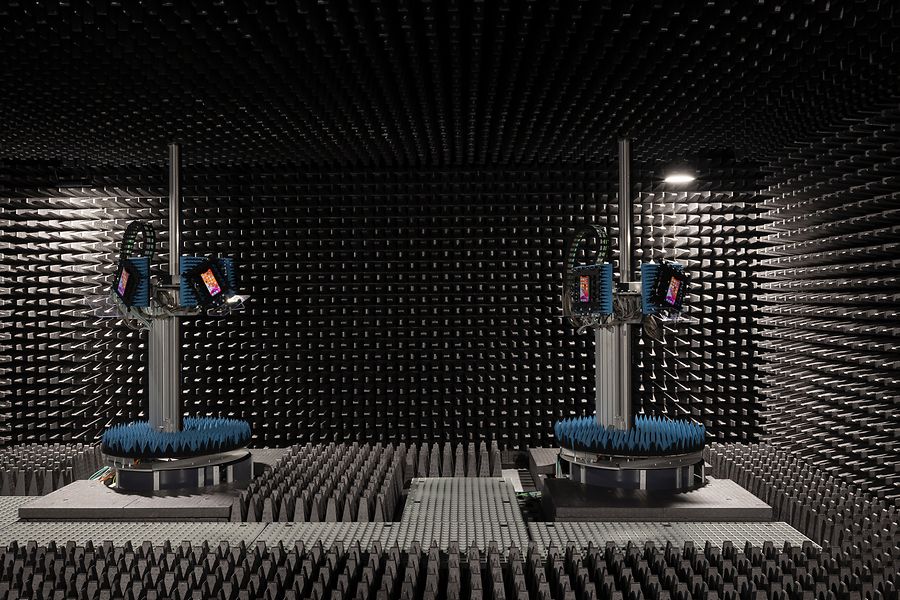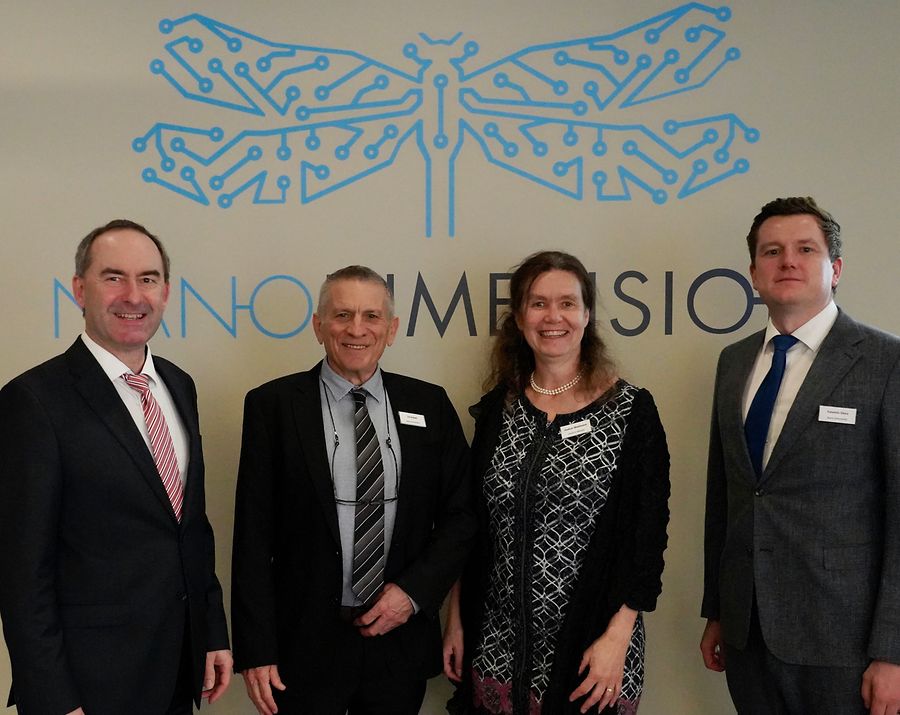
FDI
Top Investments of the Year: Bavaria still going strong in 2023
The state of Bavaria continued to be a strong draw for investment in 2023.
Feb 19, 2024
Bavaria's role as one of Germany’s most favoured locations for attracting new companies is shown by the number of international companies that established business units here. And not just new arrivals were investing throughout the state. Native and international companies already well established in Bavaria invested too to strengthen and expand their presence. Four key drivers define Bavaria as a magnet for new investment: its diverse business landscape and the associated opportunities, its strength in R&D and wealth of talent, networking opportunities, and an open-minded culture and “glocal” perspective. Let’s look at these factors and how companies took advantage of them in 2023.
A diverse business landscape with numerous opportunities for manufacturing and tech companies
The state of Bavaria is unrivalled in Germany for its high concentration of both leading national and international players. Many a company was in 2023 attracted by this unique ecosystem. Bavaria’s B2B customer base across multiple business sectors is hard to beat. Here are a few prominent examples of companies already with a strong presence in Bavaria that are now bumping up their investment even more.
Meta
Meta Platforms, the world-renowned California-based global technology giant which owns Facebook, Instagram, Threads, and WhatsApp, will employ another 100 to 150 people in Munich for what it regards as key future technologies, notably artificial intelligence and immersive technologies such as virtual reality. Meta especially wants to network with local companies to build new products.
Why Munich? “Bavaria has top companies, cutting-edge university research and now has 1,300 start-ups,” says Angelika Gifford, Vice President EMEA at Meta. “The development of future-oriented technologies will continue to progress at our Munich location,” Gifford continues.
Gifford stresses that Munich’s diverse business landscape meets all the company’s requirements. “Immersive technologies and AI are crucial for the future, and are an integral part of the metaverse. At the moment, we are laying the foundations for XR and AI – we can’t do that alone, but only together with partners from different sectors. By now being represented with an office in Munich, we can further expand our partnerships. The numerous companies, industries and academic institutions located in Bavaria make Munich an optimal location for us,” says Gifford.

Apple
Another Silicon Valley giant, Apple, announced that it will invest a further one billion euros at its European Centre for Chip Design in Munich. With that the iPhone maker is doubling its initial investment commitment from 2021 to two billion euros. Munich is already Apple's largest development site in Europe.
The Munich chip design and development centre plays an overriding role in Apple’s global strategy which aims at in-house know-how and capabilities in all relevant key technologies, most notably software and chips. Apple customers are already using developments from Munich in power management, particularly energy-saving systems, for example, in the MacBook Pro with the Apple M2 Pro and M2 Max chips.
Apple CEO Tim Cook emphasised the importance of the company’s Bavarian location: “Our Munich engineering teams are among the world's leading innovators and help to develop new technologies that are at the heart of our products. Apple has been in Munich for more than 40 years, and we are more excited than ever about our future here.”

Nano Dimension
Nano Dimension, the Israeli technology leader for systems for additive manufactured electronics (AME) chose Munich as its European headquarters because of the city’s standing as a premier technology and manufacturing hub not just in Germany, but in Europe at large. Nano Dimension will create 50 new jobs and will offer unmatched services and responsiveness to existing and future customers in proximity to its headquarters. The company also expects to make great strides in advanced materials R&D, thanks to the leading research institutions, materials companies, and strong industrial and technology workforce that exist specifically in Munich and Bavaria.
Ziki Peled, President of Nano Dimension EMEA, added, “Germany has long been a strategic focus for Nano Dimension. This concentration of our commercial and R&D relationships is hard to beat. We are happy to cement our work in the country and region by establishing our new headquarters in Munich in the State of Bavaria. This city and region are at the forefront of two aspects that define Nano Dimension – technology and manufacturing. We look forward to being even closer to the people we work with already and hope to work more with in the future.”
At its R&D centre in Munich Nano Dimension will also research disruptive 3D printing technologies. Founded in 2012, the company specialises in a digital manufacturing systems that enable the production of industrially printed electronic components using innovative materials. Invest in Bavaria and the State of Bavaria’s Representative Office in Israel supported Nano Dimension’s Munich project.
Valentin Storz, General Manager EMEA Nano Dimension, confirms the value of locating here: “In addition to its central location in Europe, Bavaria offers a comprehensive network of clusters, research institutes and cooperation partners in the fields of additive manufacturing and new materials. For these reasons, we decided in favour of Bavaria as a location.”
Technology Networks Power Innovation
Bavaria has a diverse industrial base, including sectors like automotive, mechanical and electrical engineering, information technology, and biotechnology. Bavaria also boasts a significant aerospace cluster. Two notable aerospace investment projects in 2023 were primarily driven by Bavaria’s talent pool and unique technology.
Maeve Aerospace
This Dutch aircraft developer has opened a new facility at the site of the special airport Oberpfaffenhofen to develop a new hybrid aircraft, the Maeve M80. The M80 combines the performance of a jet and the efficiency of a turboprop aircraft, made possible by a new hybrid-electric propulsion system. The 80-seater will have a range of 800 nautical miles (1,482 kilometres) and a more than 40 percent lower fuel consumption than comparable aircraft.
Martin Nüsseler, Maeve’s CTO, is to set up the development department at Oberpfaffenhofen that is to pave the way for production to commence in 2026. Maeve is still to decide where the aircraft will be built, but Oberpfaffenhofen is a prime candidate, as the site is a breeding ground for innovation and home to numerous aviation companies.
When asked by Flug-Revue magazine why the opted for Oberpfaffenhofen as its development base, Jan Willem Heinen, co-founder and CEO of Maeve Aerospace, stated: “We realise that we need to build up a high-level team in a short space of time. We also see that there is a talent pool in Munich, so it makes sense for us to open an office there.” Martin Nuesseler agrees: “To my knowledge, there are currently no alternatives in development that are equally sustainable, cost-efficient and meet the operational requirements of airlines and airports. If there were, I would applaud them, because we need more of these realistic solutions to become sustainable."
Maeve is supported by private investors, the Dutch government and the European Investment Council (EIC). The Maeve 80 maiden flight is scheduled for 2028 and first customer deliveries are slated for 2031.
Airbus Helicopters boosts 3D printing
Airbus Helicopters has opened a new new additive manufacturing centre at its Donauwörth site, thereby significantly expanding its in-house capacities for 3D printing. It now operates three 3D printers for components made of titanium, four for plastic parts and, a new one for aluminium components. Additive manufacturing offers several benefits over conventional manufacturing. It can be used for serial production as well as for individual components or small series for prototypes such as the electrically powered CityAirbus NextGen and the experimental high-speed helicopter, Racer. 3D printing also significantly raises resource efficiency in manufacturing and enables greater flexibility.
“Our extensive capabilities in this process along the manufacturing chain are a real competitive advantage,” said Stefan Thomé, Managing Director of Airbus Helicopters in Germany. “Among other advantages, 3D printing can reduce the weight of aircraft components which leads to less fuel consumption. Such potential can bring financial benefits and contribute to reducing CO2 emissions during operations.”
Bavaria’s world-class R&D and top talent pool are enablers for growth
Bavaria is home to prestigious universities and research organisations, producing a highly skilled and educated workforce. The proximity of these institutions enables companies to easily collaborate with researchers and access cutting-edge knowledge. The region's emphasis on education and vocational training ensures a pool of talent that is attractive to companies engaged in R&D and innovation, reflected by the large number of patent applications in Bavaria, which are up to 120 per cent above the European average.
Pentamaster Automation
Pentamaster Automation, the automation technology group based in Malaysia, elected to locate its first European site in Munich and plans to set up design and development centres here to cater for the rapidly evolving electric vehicle (EV) and MedTech sectors. Bavaria’s large customer base, infrastructure, technology and skilled workforce were the deciding factors for the move. The Munich base is also expected to facilitate cross-innovation with the Bavaria’s strong MedTech and semiconductor sectors.
This is in line with a major global trend towards e-mobility, the company’s co-founder and executive chairman Chuah Choon Bin tells The Edge in an interview. “As a technology company, we must always stay ahead of the curve and be at the forefront of major technology structural trends. This also gives us an edge over our competition by being a ‘custom’ solutions provider, identifying the next technology trends and focusing on them.” With the growing importance of net zero greenhouse gas (GHG) emissions globally, he expects the momentum will continue to be robust in the next three to five years as more governments and countries focus on initiatives to cut GHG emissions, starting with the automotive sector.
Chuah Choon Bin explains what motivated Pentamaster to open its fifth site in Munich. “With the establishment of our new office in Germany, we are eager to enhance our presence and diversify into the electric vehicle (EV) and MedTech sectors,” says Chuah. The German office will play a pivotal role in R&D while providing technical sales support to better serve the Group’s customers, he says. “Given that Europe, particularly Germany, is a key hub of the auto industry, with more than five multinational corporations who are already our customers for power module semiconductors, this expansion is strategically positioned.”
Identiv
Identiv, a global digital security and identification leader in IoT (Internet of Things) based in California, opened its IoT Excellence Centre for Enhanced Customer Experience outside Munich next to its Engineering Excellence Centre. The company produces radio frequency identification (RFID)-enabled solutions to enhance their businesses.
At the new centre Identiv’s RFID industry experts from will be available on-site to work with visitors to refine their breakthrough IoT product ideas into solutions that can be scaled to volume production. Their top-tier engineering team advises customers through the entire innovation cycle, from the initial concept and design through prototyping and mass production. Identiv’s engineers use the same equipment utilised in the company’s high-volume production facilities in Southeast Asia, streamlining the design process to help customers avoid time-consuming and costly redesign cycles.
An open-minded culture and a “glocal” attitude attract global players
Bavaria has a well-established tradition of companies with strong local ties but that also do business worldwide. International companies locating here can tap into this existing globally oriented innovative environment to move their own businesses forward.
ASMPT founds European Centre of Competence
ASMPT, headquartered in Singapore, has opened the first European SEMI Centre of Competence (CoC) in Regensburg to increase resilience to supply chain disruptions. Among other things, it serves as a laboratory for customers for proof of concepts in the context of innovations and applications and as a direct point of contact for the rapid transfer of expertise. The competence centre is modelled on ASMPT's international Centres of Competence. The new Regensburg facility will focus on ASMPT’s SEMI solutions business, which provides a range of assembly and packaging equipment for the microelectronics, semiconductor, photonics, and optoelectronics industries.
This European SEMI CoC in Regensburg follows a successful corporate philosophy of strict customer orientation with established ASMPT facilities in Asia, the US or Europe, such as in Munich. It offers protection against the overall increase in volatility in the global electronics supply chain. “ASMPT sees its role not only as a leading supplier for the semiconductor and electronics industry worldwide, but also as a driver of innovation for manufacturing processes,” explains Günter Lauber, Executive Vice President, Chief Strategy and Digitalisation Officer and SMT Segment CEO of ASMPT. “For this reason alone, it is important for us to further expand our already substantial investments in research and development worldwide.”
PACCAR Parts
PACCAR Parts, a unit of the US commercial vehicle manufacturer, has started construction of a new, state-of-the-art parts distribution centre in Massbach, Lower Franconia, Bavaria. The official ground-breaking ceremony signalled the start of an €85 million investment, including financial backing from the state government of Bavaria. “This new parts distribution centre will play a key role in further strengthening our industry-leading parts supply for DAF truck partners and customers in Germany, Switzerland and eastern France," said Dick Leek, General Manager of PACCAR Parts Europe.
The new 22,000 square metre facility is located on a 54-hectare site and is expected to open in 2024. It will provide first-class service to the DAF truck partner network, with shipments and emergency orders delivered within hours. The parts distribution centre will have a storage capacity of over 80,000 different parts.
In line with PACCAR’s focus on environmental protection, the building is powered by solar energy, has green roofs and heat pumps to regulate the building temperature year round. The entire fleet of material handling systems will be fully electric for zero exhaust emissions and quiet operation. “We are delighted that the company has located here, and its ecological focus sends a clear signal for the future,” says District Administrator Thomas Bold.
Siemens
Siemens, the global industrial and technology group based in Bavaria, is a prime example of a well-established company that is further expanding its presence in Bavaria by entering new technology areas. In the summer of 2023, the DAX-listed company announced plans to invest in the development of an industrial Metaverse. In total, Siemens has earmarked a €1 billion investment for this strategic move, €500 million of which for a new campus for development and high-tech production at Erlangen alone. The goal is to use relevant data and artificial intelligence to render production more sustainable and flexible. A comprehensive overview of this investment’s potential for innovation is provided by the Report on the Industrial Metaverse compiled jointly by Siemens and the MIT Technology Review.